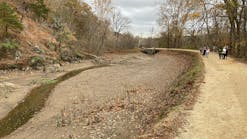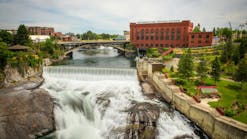Porous Paving Delivers Results for UPS Hub
The town of Hilton Head Island, N.C., and Beaufort County storm water requirements call for no runoff increase into sensitive coastal and inland waterways—a problem for the UPS Customer Service Hub at the Hilton Head Airport, which needed to expand operations. With expansion came a need for more pavement to handle more UPS trucks, customers and employee traffic. In addition to the runoff issue, the installation needed to be quick and efficient—critical to keeping the facility running without incurring delays.
Facility designers from the UPS corporate office first considered porous concrete and porous asphalt. The first met two of the three criteria: the permeability and traffic load, but not the speedy installation. Porous concrete takes seven to 10 days to cure in the winter, and truck traffic needs to remain off it for 10 days regardless of installation season. Pervious asphalt only met one of the criteria: speedy installation.
“Porous asphalt has a drain-down factor where the bituminous asphalt becomes viscous in the heat, settles and clogs, becoming impervious,” said Chere Peterson, green infrastructure educator and certified porous paving installer. “Once the drain-down occurs, heat and the weight of the trucks will cause rutting in the asphalt.”
UPS designers turned to Gravelpave2, which remains porous by containing uniform-sized aggregate in cylinders separated from the porous base course by an integrated geotextile fabric. It can sustain heavy traffic with the combination of cylinder structures, aggregate and base course. What sealed the deal for the UPS Hub designers was the fast installation. The entire system was installed in less than three days in March 2004 and was immediately available to traffic. Disruption to the facility was minimal, and “the installation is still functioning perfectly,” Peterson said.
Download: Here







